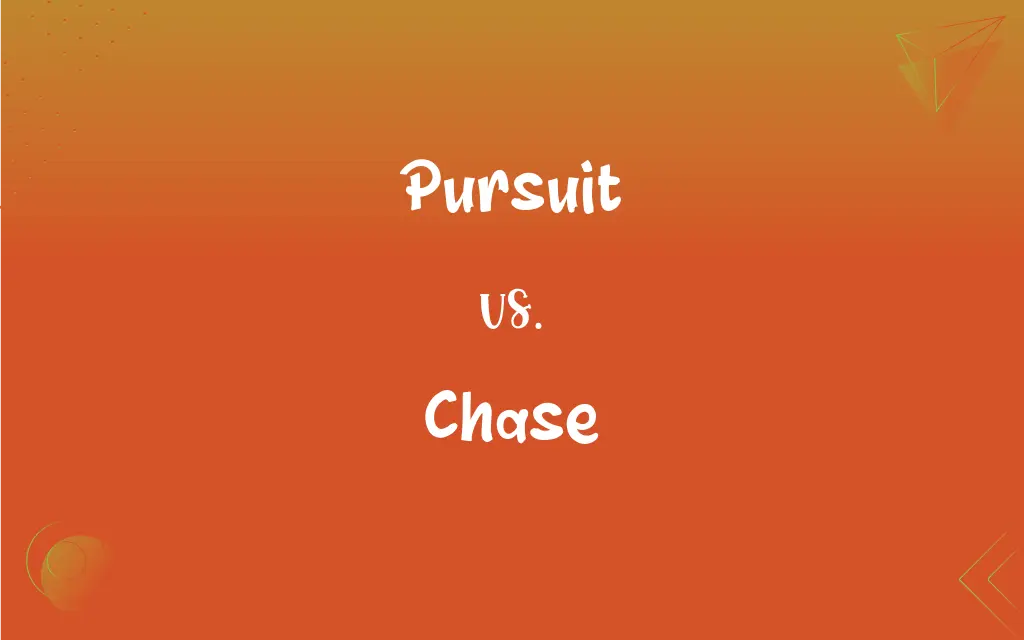Pursuit vs. Chase: What's the Difference?
Edited by Aimie Carlson || By Harlon Moss || Published on December 5, 2023
Pursuit often implies a continuous and long-term effort towards a goal, while chase typically refers to a rapid, more immediate act of following or seeking to catch something or someone.

Key Differences
Pursuit encompasses a broad range of activities, often with a focus on achieving a long-term goal or ambition. It can be methodical and enduring. On the other hand, chase implies a more immediate, intense, and often physical act of following or seeking to catch someone or something.
The term pursuit is frequently used in contexts where the focus is on the journey or the continuous effort, such as in career pursuits or intellectual pursuits. In contrast, chase often conveys urgency and immediacy, typically used in situations like a police chase or an animal chase.
In the realm of emotions and relationships, pursuit can indicate a steady and persistent effort to achieve emotional goals. Conversely, chase might denote a more direct and possibly aggressive approach to obtaining immediate desires or objectives.
Pursuit is also used in legal and formal contexts, indicating a sustained endeavor, like the pursuit of justice. Chase, in contrast, is less formal and can refer to short-lived, sometimes impulsive actions.
In literature and art, pursuit can symbolize a character's quest or life's journey, while chase often creates scenes of tension, action, and immediate conflict.
ADVERTISEMENT
Comparison Chart
Duration
Long-term and ongoing
Short-term and immediate
Intensity
Methodical, less intense
Rapid, more intense
Context
Broader, including goals and ambitions
Often physical or literal following
Implication
Suggests dedication and continuous effort
Implies urgency and direct action
Usage in Language
More formal, used in various contexts
More informal, often used in action-oriented contexts
ADVERTISEMENT
Pursuit and Chase Definitions
Pursuit
The action of striving towards something.
His pursuit of happiness was evident in his daily activities.
Chase
To seek the attention or love of, especially romantically.
He spent years chasing after his high school sweetheart.
Pursuit
A quest to achieve a goal or objective.
Her pursuit of a medical degree was challenging but rewarding.
Chase
To pursue in order to seize or affect.
The reporter chased the story across the city.
Pursuit
The act of following or chasing, especially in sports.
The cyclist was in hot pursuit of the leader.
Chase
To follow rapidly in order to catch or overtake.
The police chase lasted for several miles.
Pursuit
Legal endeavor to obtain or achieve.
The lawyer was relentless in the pursuit of justice.
Chase
To drive or cause to go in a specified direction.
The shepherd chased the sheep back into the pen.
Pursuit
A specific occupation, hobby, or interest.
Photography was more than a hobby; it was his lifelong pursuit.
Chase
To engage in a pursuit to catch for a game.
They chase foxes as a traditional sport.
Pursuit
The act or an instance of chasing or pursuing
The pursuit of the suspect by the police.
Chase
To follow rapidly in order to catch or overtake; pursue
The police officers chased the thief. The dog chased the cat across the yard.
FAQs
Can pursuit imply a negative connotation?
Sometimes, especially if it's obsessive or harmful.
Does chase always involve speed?
Typically, it implies rapid action.
Does chase have a more immediate goal?
Generally, it implies a more immediate and direct objective.
Is chase used in romantic contexts?
Yes, often to describe actively seeking someone's affection.
Is chase always physical?
Often, but it can also refer to non-physical efforts, like chasing a dream.
Can pursuit be passive?
Yes, pursuit can be a more passive, long-term effort.
Can pursuit be used in legal terms?
Yes, as in the pursuit of justice.
Is pursuit always positive?
Not always, but it often carries a connotation of determination and effort.
Can chase be metaphorical?
Yes, like chasing a dream or an idea.
Is pursuit used in sports?
Yes, especially in races or long-term athletic goals.
Can pursuit be a hobby?
Yes, it can refer to a continuous interest or hobby.
Does chase require physical fitness?
In literal chases, yes, but it can also be metaphorical.
Does chase imply a winner and a loser?
Often, especially in competitive contexts.
Can pursuit be part of a strategy?
Yes, it can be a strategic, long-term plan.
Can pursuit be a career path?
Yes, as in pursuing a specific profession.
Is chase ever used in a playful context?
Yes, like in games or lighthearted scenarios.
Is chase used in thrillers or action genres?
Frequently, to describe fast-paced action scenes.
Can pursuit end without achieving the goal?
Yes, it's possible not to achieve the intended goal.
Is chase always intentional?
Usually, it involves a deliberate act of following or seeking.
Can pursuit be lifelong?
Yes, pursuits can span an entire lifetime.
About Author
Written by
Harlon MossHarlon is a seasoned quality moderator and accomplished content writer for Difference Wiki. An alumnus of the prestigious University of California, he earned his degree in Computer Science. Leveraging his academic background, Harlon brings a meticulous and informed perspective to his work, ensuring content accuracy and excellence.
Edited by
Aimie CarlsonAimie Carlson, holding a master's degree in English literature, is a fervent English language enthusiast. She lends her writing talents to Difference Wiki, a prominent website that specializes in comparisons, offering readers insightful analyses that both captivate and inform.







































































